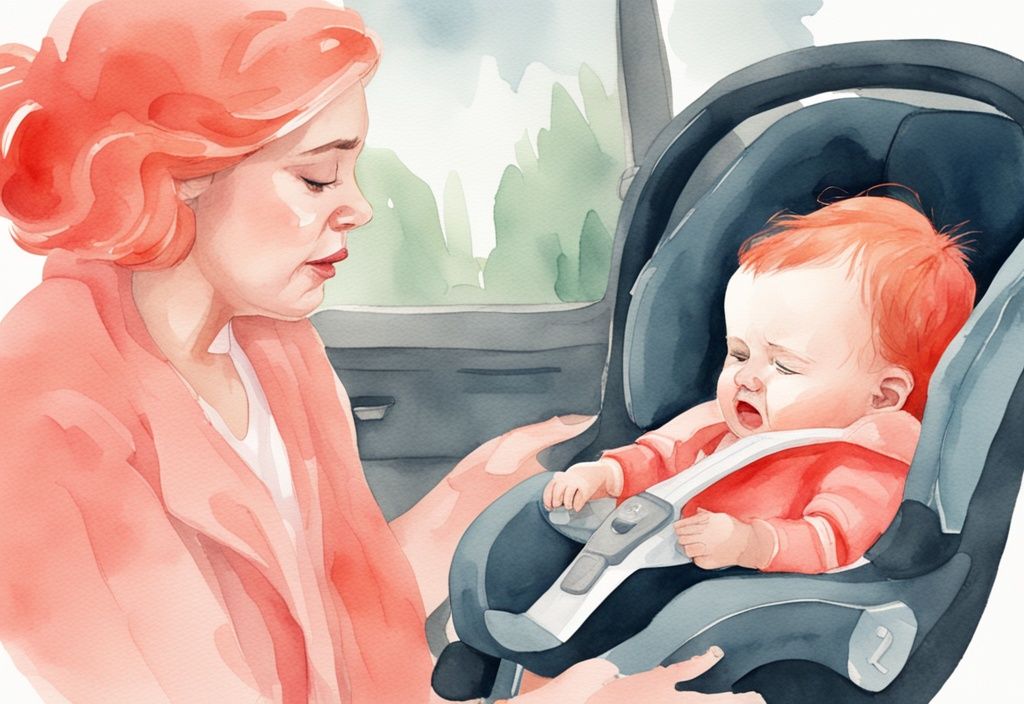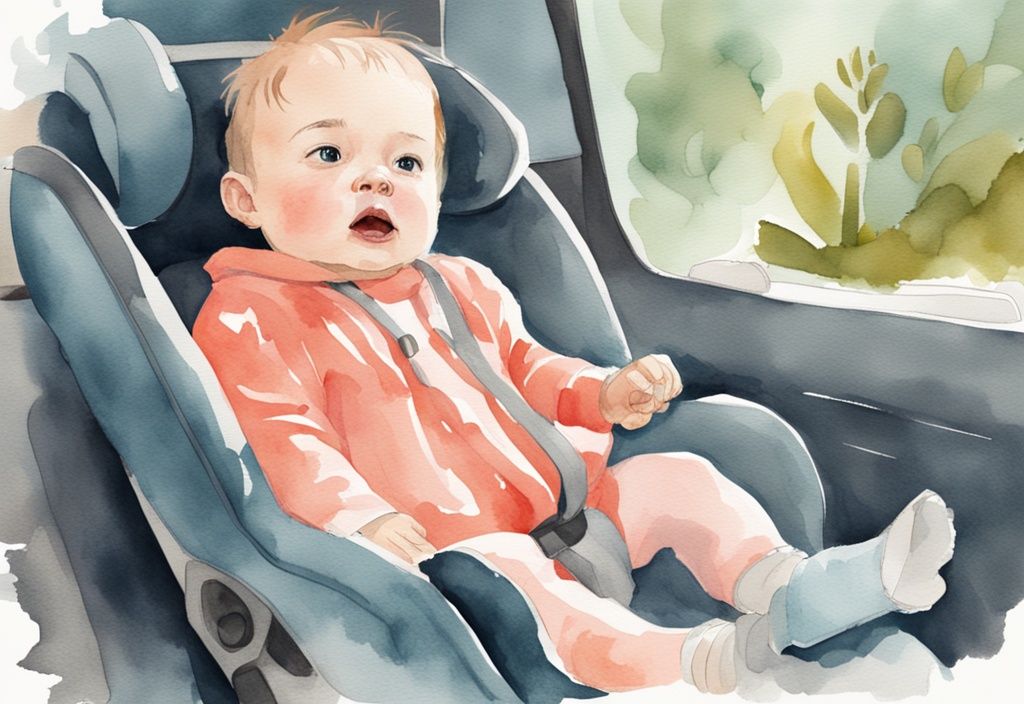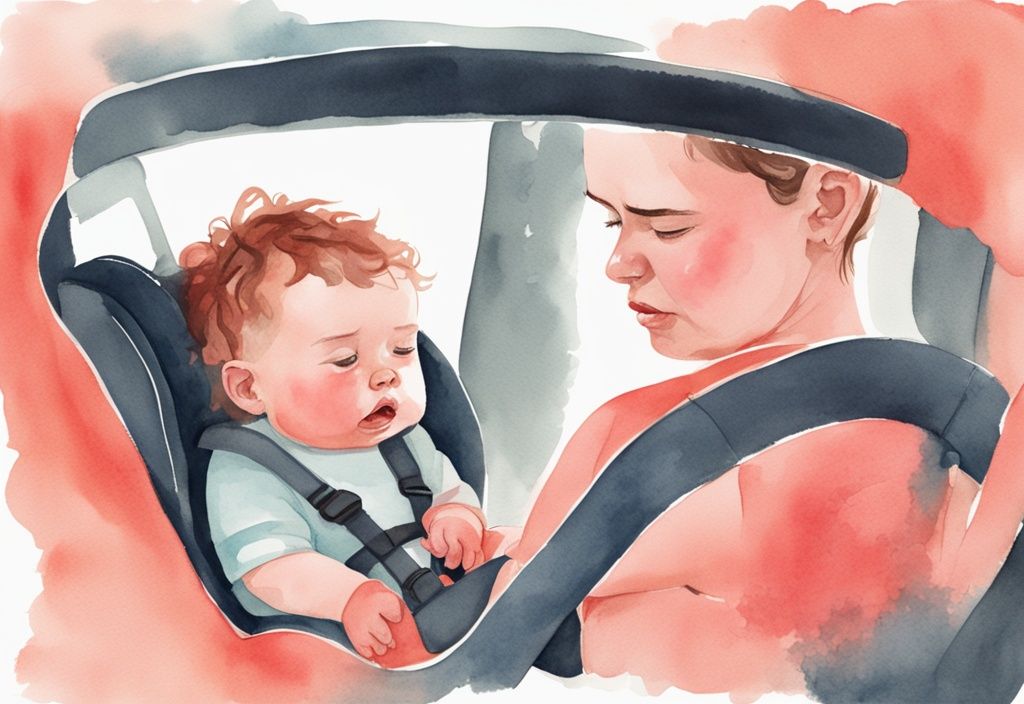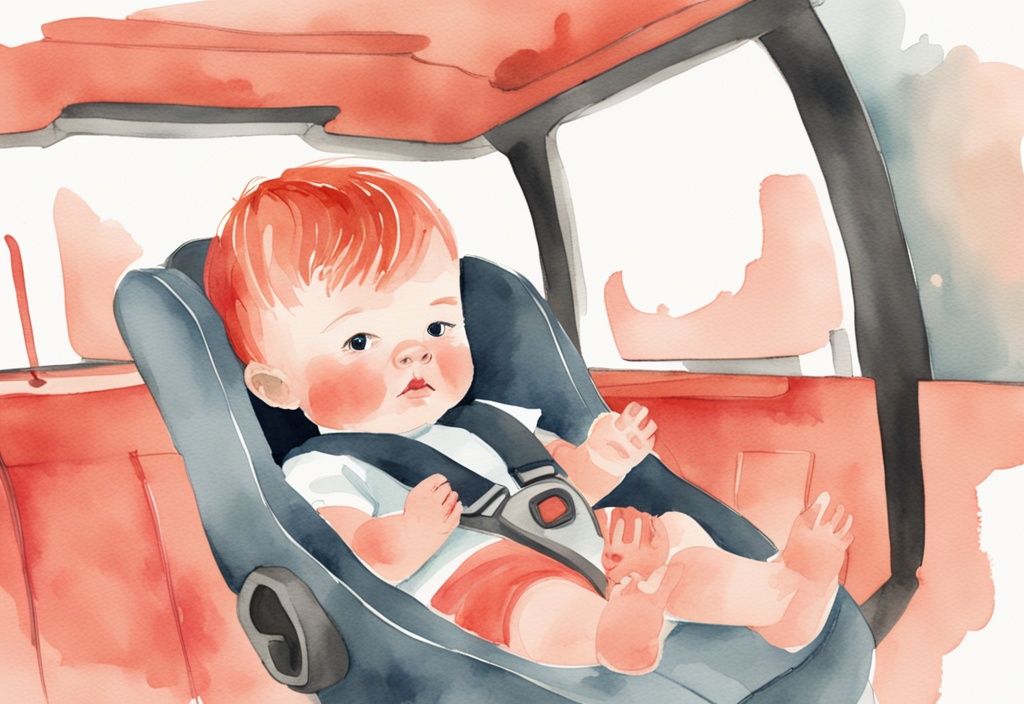Does your little one scream the house down every time you mention the car seat? Yes, mine did too. You’re defintely not in this alone. As a fellow mom, I totally get just how frustrating and heartbreaking it can be. That’s why I’m here, why we’re here together in fact – to navigate this crazy world of parenting, right down to the question, ‘why does my baby hate the car seat?’
In this article, we’ll address some common reasons your baby may be protesting the car seat – from discomfort to separation anxiety. I’ll be sharing practical solutions, tried and tested from my own experience, to transform your journeys from a time of tears to tranquil travels. Together, let’s turn those frowns upside down and ensure smoother, happier car rides all round!
Common Reasons Why Your Baby Dislikes the Car Seat
Discomfort from Rapid Growth and Improper Fit
Babies grow at an astonishing pace, and car seats need to be adjusted frequently to keep up. A common reason why your baby might hate the car seat is the discomfort caused by a tight or improperly fitting harness. The straps need regular adjustments to ensure they’re snug but not restrictive.
Additionally, if these straps are twisted or incorrectly positioned, it can make the seat even more uncomfortable. As your baby grows, the infant padding might become too small, contributing further to the discomfort.
Temperature Issues Making Your Baby Uncomfortable
Babies are more sensitive to temperature fluctuations than adults, which is another factor contributing to why your baby might hate the car seat. Often, there can be a significant difference in temperature between the front and back of the car, making it difficult to maintain a comfortable environment for your little one.
Pre-heating or pre-cooling the car and adjusting air vents to distribute air evenly can help. Dressing your baby in layers allows for easy adjustments, ensuring they remain comfortable regardless of the temperature changes.
Boredom: Biggest Reason for Babies Hating Car Seats
As babies develop new cognitive and motor skills, staying still in a car seat can become monotonous and frustrating, explaining another reason why your baby might hate the car seat.
Their need for constant stimulation isn’t met while confined. To mitigate this, introducing car seat-safe toys, engaging in singing songs, or encouraging interaction with older siblings can provide much-needed distraction and make the car ride more enjoyable.
Long Car Trips: A Challenge for Little Ones
Extended car rides can exacerbate the reasons why your baby hates the car seat. Being confined for long periods can lead to discomfort and a growing sense of restlessness in both babies and toddlers.
Therefore, it’s essential to plan regular breaks every 2-3 hours to allow your little one to move around and play. This can significantly improve their overall comfort and mood during long journeys.
Solving Separation Anxiety in the Car Seat
Separation anxiety is another key reason why your baby might hate the car seat. Being unable to see their caregiver can cause distress and anxiety.
One solution is to use a car seat-safe mirror to maintain visual contact with your baby. Alternatively, having an adult or older sibling sit next to them can offer reassurance and ease their anxiety. For those interested in understanding more about the concept of baby dedication, you can read our detailed guide on what is a baby dedication.
Dealing with Car Sickness in Babies
Motion sickness is a lesser-known but significant reason why your baby might hate the car seat. Symptoms can include discomfort and nausea, making every car ride an unpleasant experience.
To address this, improving airflow in the car, using car sickness glasses designed for infants, or adjusting the seating arrangement can alleviate these symptoms. If the problem persists, consulting a pediatrician for additional interventions or medications may be necessary.
Identifying Signs of Car Seat Discomfort in Babies
Babies often express their discomfort in ways that can sometimes be bewildering to parents. One common question many parents ask is, “why does my baby hate the car seat?” Understanding and identifying the specific signs of car seat discomfort can help alleviate this issue and make car rides more pleasant for everyone involved.
-

Crying or Fussiness Directly Linked to Car Rides: If your little one consistently cries or becomes fussy during car rides, it might be a clear sign of discomfort. Observing when and how often this happens can give you clues about potential causes, like strap tightness or temperature issues. - Physical Signs of Discomfort: Watch if your baby arches their back, kicks, or tries to wriggle out of the seat. Such signs indicate they’re not comfortable. These movements often point to potential issues with how the seat fits or is positioned.
- Flushed or Reddened Skin: Babies can be quite sensitive to temperature. If your baby’s skin looks flushed or red, they might be overheating. On the other hand, pale and cool skin suggests they could be too cold. Balancing the car’s temperature can ease this discomfort.
- Visible Discomfort When Buckling Up: Pay close attention to your baby’s reactions when you secure the harness. Grimacing, crying, or other signs of distress while buckling up could mean the straps are too tight, the harness is twisted, or the padding no longer fits well.
- Reluctance to Get into the Car Seat: If your baby resists or seems reluctant every time they have to get into the car seat, this might indicate a negative association. This reluctance could stem from past discomfort, boredom, or even car sickness, making car rides unpleasant for them.
Recognizing these signs of discomfort can be the first step toward more pleasant car journeys. By addressing the specific reasons why your baby hates the car seat, you can implement solutions tailored to their needs, enhancing their overall comfort and safety.
Solutions to Improve Your Baby’s Car Seat Experience
Ensuring Proper Harness Strap Position
Proper harness strap positioning is crucial for your baby’s comfort and safety. Regularly inspect the straps for twists and ensure they are snug but not too tight. Adjust the chest clip to armpit level to secure the baby firmly while allowing for some movement. Additionally, as your baby grows, make frequent adjustments to the straps to accommodate their changing size. This helps your baby remain comfortable and secure during car rides. Comfortable straps can significantly reduce your baby’s distress, tackling why your baby might hate the car seat.
Adjusting Car Temperature for Comfort
Temperature regulation is another essential aspect of keeping your baby comfortable in their car seat. Use the car’s climate control features to create a pleasant temperature before placing your baby in the seat. Position air vents to provide even airflow throughout the car to prevent hot or cold spots. Dressing your baby in layers is also a practical solution, allowing for easy adjustment to changing temperatures. Ensuring the car is neither too hot nor too cold can address one of the reasons why your baby might hate the car seat. For more information on the importance of car seats and booster seats, visit https://www.nhtsa.gov/equipment/car-seats-and-booster-seats.
Using Car Seat-Safe Toys and Entertainment
Entertainment can be a vital tool in making car seat time more enjoyable for your baby. Introduce car seat-safe toys that can be securely fastened to avoid becoming projectiles. Singing nursery rhymes or playing soothing music can also capture their attention and provide comfort. These distractions can help divert your baby’s focus from the discomfort of being confined. It’s one way to address why your baby might hate the car seat.
Importance of Taking Breaks on Long Car Trips
Long car trips can be particularly challenging for babies. Plan to take breaks every 2-3 hours for feeding, changing, and letting your baby move around. Use rest stops or safe areas for these breaks to give your baby some time out of the car seat. This practice not only addresses physical comfort but also gives them a mental break from the monotony of sitting still. This approach helps tackle why your baby might hate the car seat during prolonged travel.
How Reassurance and Visual Contact Can Ease Anxiety
Separation anxiety can make car seat time stressful for your baby. Installing a car seat mirror allows your baby to see you, providing visual reassurance throughout the ride. Frequent verbal reassurances can also be comforting. If possible, having another adult or sibling sit next to your baby can offer additional comfort. This close physical presence can significantly reduce anxiety, alleviating the reason why your baby might hate the car seat.
Top Tips for Alleviating Car Seat Sickness
Motion sickness can make car rides unpleasant for your baby. Ensure good airflow in the car by keeping windows slightly open and adjusting vents. Position your baby’s seat to minimize the perception of motion, which can help reduce nausea. Car sickness glasses can also be a useful tool. In more severe cases, consulting with a pediatrician for medication or other interventions might be necessary. These steps can make the car seat experience more pleasant and address why your baby might hate the car seat due to motion sickness.

Maintaining Safety While Enhancing Comfort in the Car Seat
Balancing safety and comfort in car seats can be quite the juggling act for parents. Let’s dive into some common issues and find out why your baby might hate the car seat, and what you can do to help.
Guaranteeing Correct Car Seat Positioning and Angle
One of the major reasons your baby may hate the car seat could be due to discomfort from incorrect positioning. Ensuring the car seat is installed at the correct angle helps maintain a natural and comfortable posture for the baby.
This prevents their spine from being hunched, supporting overall comfort. Adequate padding is crucial too, supporting the baby’s head and spine for safety and comfort during the ride.
Risks of Aftermarket Accessories You Didn’t Know
Aftermarket accessories might seem like a savior for enhancing comfort, but they come with significant risks. Unapproved accessories can compromise the car seat’s safety and void the manufacturer’s warranty.
Sticking to manufacturer-approved additions ensures the integrity and safety of the car seat. This is essential for preventing accidental hazards and ensuring your baby’s safety during car rides.
Minimizing Choking and Projectile Hazards in the Car
Understanding why your baby hates the car seat often involves addressing immediate safety concerns, such as choking and projectile hazards. Avoid giving bottles or snacks while the baby is in the car seat to prevent choking episodes.
Using car seat-safe toys securely fastened helps eliminate the risk of objects becoming dangerous projectiles in case of a sudden stop or accident, ensuring a safer environment for the baby.
Addressing Needs of Overstimulated or Colicky Babies
Overstimulated or colicky babies may find car rides particularly distressing, contributing to their dislike of the car seat. Reducing noise and visual stimuli within the car can help soothe overstimulated babies.
For colicky infants, arranging for a smooth ride and minimizing disruptions is key to easing their discomfort. Creating a calm and controlled environment helps your baby feel more secure and comfortable during car trips.
Practical Tips for a Cry-free Car Ride
Adjusting to the Car Seat Environment Successfully
When faced with the question, “Why does my baby hate the car seat?” one effective strategy is to gradually introduce your baby to the car seat environment. Start with short trips to help your baby get accustomed to being restrained in the car seat. Brief rides around the neighborhood can be a good starting point.
At home, allow your baby to explore the car seat without the pressure of a trip. This helps them become familiar with their car seat, easing the transition to longer car rides.
Creating Positive Associations with the Car Seat
Creating positive associations is key to managing why your baby may hate the car seat. Use positive reinforcement and praise when your baby is calm in the car seat. Consider small rewards, such as handing them a favorite toy or playing a fun song once they are securely fastened.
Positive experiences during car rides can help your child develop a more favorable view of the car seat, transforming it from a source of discomfort to a source of enjoyment.

Importance of Pre-Trip Preparation and Routine
Establishing a calm and consistent pre-trip routine can significantly reduce stress for both you and your baby. Advance preparation is critical—pack essentials like diapers, snacks, and toys to avoid last-minute rush or disruptions. Following a predictable routine will help your baby know what to expect, creating a sense of security that might alleviate some of their car seat resistance.
Using Familiar Comfort Items to Soothe Your Baby
Incorporate familiar comfort items to make the car seat experience more enjoyable for your baby. A favorite blanket, toy, or pacifier can provide the reassurance they need. Additionally, familiar scents, such as a shirt worn by mom or dad, can offer extra comfort.
These small yet significant items can help mitigate the discomfort that often has parents questioning why their baby hates the car seat.
The Magic of Singing, Music, and White Noise in the Car
One of the most effective ways to soothe a baby in the car is through sound. Play soothing music or white noise to help your baby relax. Softly singing to your baby can provide comfort and create a sense of security during the drive.
The rhythmic and calming effects of music and a familiar voice can turn a potentially fussy car ride into a peaceful journey, addressing the common concern of why your baby hates the car seat.
When to Consult a Pediatrician for Car Seat Discomfort Issues
Sometimes, no matter what you try, your baby just doesn’t seem comfortable in the car seat. Here’s how to know when it might be time to get some professional advice.
Severe or Persistent Discomfort Despite Trying Various Solutions
If your baby continues to experience severe discomfort even after adjusting the car seat fit, temperature, and ensuring enough entertainment, it might be time to seek professional advice. Persistent crying, visible physical discomfort, or unrelenting fussiness during car rides could indicate an underlying issue that needs medical attention.
Concerns of Underlying Physical Issues
Sometimes, babies might hate their car seat due to physical issues like reflux, musculoskeletal discomfort, or other health conditions that aren’t immediately obvious. If you suspect that common remedies aren’t working because of potential physical complications, consulting a pediatrician is crucial. They can perform a thorough examination to rule out or diagnose any medical issues contributing to your child’s discomfort.
Need for Additional Reassurance or Professional Insight
When parents have tried every recommended solution without success, it’s natural to seek further guidance. Pediatricians can provide valuable insights, recommend specialized car seat adjustments, or suggest alternative strategies tailored to your baby’s specific needs. Getting professional input can alleviate worries and ensure your baby’s car seat experience becomes more pleasant and safe.
Observing Behavioral Patterns Related to Car Seat Discomfort
If you notice patterns such as your baby being consistently calm in other seating but distressed in the car seat, this could indicate a deeper issue that needs expert evaluation. Documenting these behaviors and sharing them with your pediatrician can help in pinpointing the cause of the discomfort, whether it’s physical or psychological.
Addressing Specific Queries with an Expert
If you have specific concerns like “why does my baby hate the car seat,” a pediatrician is well-equipped to provide answers and suggest detailed, practical solutions. Their professional insight can uncover overlooked factors and provide peace of mind, ensuring a safer and more comfortable journey for your baby.
FAQs
Why does my baby cry every time in the car seat?
Babies crying in the car seat can be due to various reasons. Some common causes include discomfort from an improper fit, temperature issues, boredom, or even separation anxiety. Making sure the car seat fits your baby well, keeping the car at a comfortable temperature, and providing some entertainment or reassurance can work wonders to keep those tears at bay.
Is it safe to give my baby snacks in the car seat to keep them calm?
Sadly, it’s not safe to give snacks while your baby is in the car seat due to the choking hazard it presents. Instead, consider using car seat-safe toys or playing some soothing music. These can be great alternatives to help keep your little one calm and content during car rides.
When can I turn my baby’s car seat forward-facing?
Pediatricians advise keeping your baby in a rear-facing car seat until at least the age of two. This position offers better support for your baby’s head, neck, and spine, ensuring they are as safe as possible during car journeys.
How can I entertain my baby in the car seat?
Keeping your baby entertained in the car seat can be a bit of a challenge, but it’s doable! Use car seat-safe toys, sing some fun songs, or engage siblings or other adults in the car to help keep your baby occupied. A little distraction can go a long way in reducing fussiness and making the ride smoother for everyone.
Can motion sickness cause my baby to hate the car seat?
Absolutely, motion sickness can make car rides quite unpleasant for your baby. You might want to try adjusting the airflow or seating arrangement to see if that helps. If the problem persists, a chat with your pediatrician can provide additional insights and possible solutions to help alleviate your little one’s discomfort.


